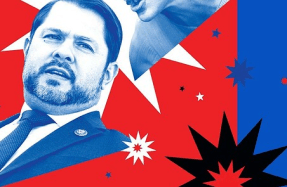Distant Learning

On the night Esteban’s mother went to the hospital, five ambulances crowded the street in front of their red-brick walk-up in the DC suburbs. It was late May 2020, and COVID-19 had swept through their densely packed apartment complex, where many of the one- and two-bedroom units housed multiple immigrant families from Central America. More than half of the people in their zip code who were tested that April had the virus—a rate roughly 20 percent higher than in the rest of Virginia—and 17-year-old Esteban, his parents, and the family with whom they shared their apartment were among them. For weeks his mother had a splitting headache, and her throat hurt so much she had trouble swallowing. By that May evening, she had deteriorated to the point where she could barely breathe on her own.
Out on the sidewalk, amid the ambulances’ flashing lights, Esteban held his infant sister, Amalia, while his father climbed into a waiting Uber with his mother. (They hadn’t called 911 because one of Esteban’s uncles had been ferried in an ambulance after he had contracted COVID and incurred a bill he had no way of paying.) As the only English-speaking member of the family, Esteban argued he should go to the hospital. His father disagreed. “You need to take care of the baby,” he said.
It was a terrifying prospect. When his parents brought Amalia home seven months earlier, Esteban had gazed in wonder at her delicate, tiny form and refused to hold her. “He was scared he might hurt her,” his father recalled. Now, with his parents heading to the emergency room, Esteban was in charge of looking after his sister for the very first time. It would be the longest three weeks of his life.
The baby cried incessantly. She had been breastfed and initially refused the bottles of formula Esteban tried to give her. He was still fighting off the virus and was terrified of infecting her, so he wore a mask. But one of the few ways to soothe her was close physical contact, so he took to wrapping her in a light blue blanket and cradling her to his stout, muscular frame. “I was so scared I’d get her sick,” he told me.
In the family’s sparsely furnished living room, a scroll inscribed with Jeremiah 29:11 hung on the wall: “For I know the plans I have for you, plans to prosper you and not to harm you, plans to give you hope and a future.” Next to it were framed certificates of attendance commemorating Esteban’s perfect school record at Justice High, a nearby public school where he was a junior.
He tried to stay in the good graces of his teachers, installing himself on a threadbare crimson couch and logging on to classes on his school-issued laptop. But his baby sister, who had recently started to crawl, always seemed in danger of toppling chairs and putting stray pens in her mouth. When he cordoned her off where she couldn’t hurt herself, she cried for her mother. Esteban took to turning his microphone off during class. He became a spectral presence, volunteering answers only when Amalia took
You’re reading a preview, subscribe to read more.
Start your free 30 days





